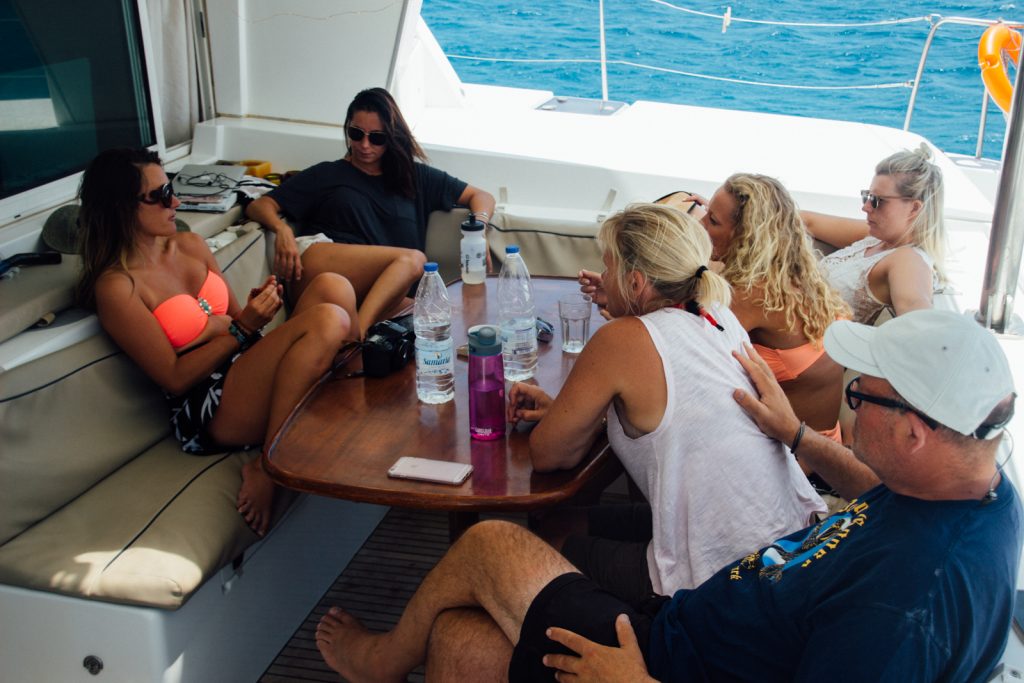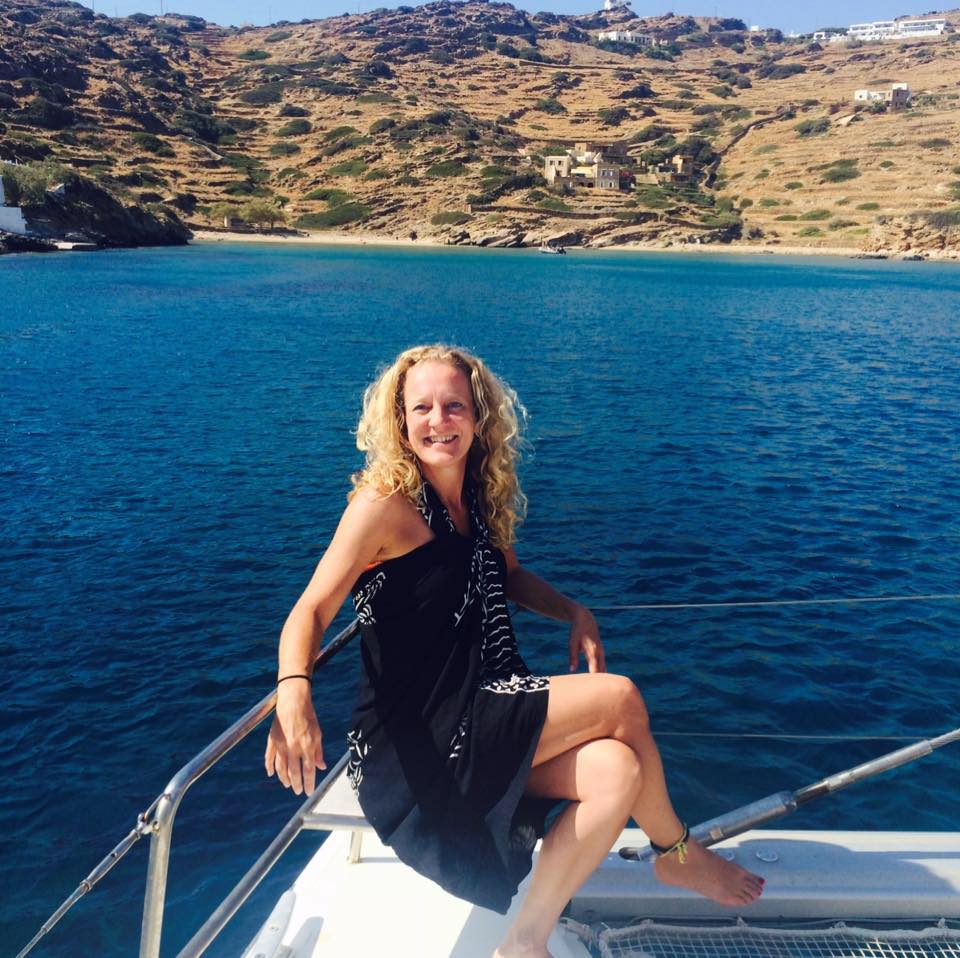Angelique Slob, PinQ Consult has spent her career in HR advising companies on cultivating their culture. As a remote worker herself Angelique understands the challenges that come with this lifestyle both for the individual and the employer. In this interview we talk about coworking, coliving, the importance of connection and she shares top tips for companies and startups with remote employees.
1) What is your experience of the coworking movement?
Regularly I will go to coworking spaces, for example in the Netherlands where I am from. But I found that in some spaces people don’t really connect because they go and sit behind their laptop rather than network, where others are more community minded.
My first experience of coliving and coworking workations was two years ago when I visited Tarifa and have since been on the Nomad Cruise, wifitribe and Coboat.
2) Why do you think people are choosing this working life over ‘normal’ jobs?
For many people the main reason for choosing to work remotely is because they want to travel and experience the world. If you’re a surfer you can follow the surf around the world without having to give up an income.
For me what’s important is that remote work allows me to live my unique lifestyle. It allows me to live in Portugal so I can learn Portuguese, to live in Brazil so I can learn capoeira. It gives me the flexibility to organise my days to suit me.
Remote working and traveling has been made easier with the opening of coworking spaces. They take care of the practical elements so you don’t have to. Internet, power and space is all there so you don’t lose time organising or finding wifi.
It is often a good option when you’re combining work and travel. Because you can stay in a hotel which can be lonely, or you can stay in a hostel surrounded by backpackers having fun when you’re working, so coliving / coworking gives a lot of added value and it’s something people are willing to pay for.
3) What are the benefits of this movement?
I believe people are healthier and happier. In Brazil people, in between work time, will be at the beach surfing and exercising, spending a lot of time outside.
I’ve seen that remote working enables the blend of professional and personal – business, community, network, friendship and relationships is a raw cocktail which you don’t get in traditional work roles and spaces.
People start to lose their professional mask because there’s nowhere to hide especially if you’re going to be living together, you’re forced to be who you are. It makes for deeper more meaningful connections and therefore better outcomes.
A lot of people living and working this way have their own projects they want to develop. Being a remote worker while traveling gains them entry to a global community which provides support, guidance and access to skills offered in a collaborative environment.
The movement is part of a bigger thing and it’s not so much about money. We are in a sharing economy. Many people don’t have (or choose) traditional families these days, nor do they stay in the same house until it’s time to draw a pension and so sociologically we are seeing a lot of things changing. More people stay single for longer and seek different experiences, opting to live with different people for varying amounts of time or even on their own.
4) What challenges do people experience when working remotely?
There are practical challenges such as wifi and finding physical places to work. For me it’s a big challenge to stay focused and be good with time management and to work efficiently, especially if I don’t have a fixed or suitable place to work from.
On another level the challenge is maintaining connection with other colleagues and maintaining relationships with friends at home. I’ve found that some of my old friends don’t always understand what this lifestyle is all about. And sometimes it is hard to adjust back to what is the norm in society in the Netherlands.
So connecting with likeminded people in the digital nomad community has helped because they understand my challenges and can relate.
I explored this topic of connection on Coboat and on the Nomad Cruise. In the workshops I had people explaining that they felt more connected to a group of digital nomads or people they had met in coworking spaces than to their own colleagues. Some people had never even met their colleagues.
Some people weren’t even aware they were lacking this sense of connection and some were aware but didn’t know what to do about it.

Angelique‘s session on connection when working remotely
5) How can companies / employers mitigate the impact of a loss of connection?
Encourage communication on a different level than just work level so you can become more connected than just on a professional level. This should be intrinsically part of the culture. It’s not something that can be forced or sent in a newsletter every month, it requires work.
Companies should bring their teams together in a physical space at least once a year for at least a week to live and work together. Coboat, the Nomad Cruise are perfect for this, but many successful start-ups hire an entire villa for a couple of weeks a year for a company retreat. I am organizing a carnival retreat in February in Brazil myself.
An added value of being on Coboat is that people also connect through the activity of sailing. For me, the connections I made on Coboat and the Nomad Cruise were deep connections which have lasted past the experience itself. We are still connected and help each other, asking advice and are arranging to meet again at the web summit for example.
Freedom and connection looks like a contradiction but it isn’t. What I learned on the boat was that working remotely gives you freedom but if managed correctly working remotely can give the deepest connections ever.
6) How can startups cultivate their culture with a team of remote workers?
First of all, forget everything you learned about how to build an organisation and question it. Really think about what you need and what you want.
Buffer is doing that really well, building their culture by gaining input from their employees. They really think about it, asking what they should do and how should they build their culture. It won’t just happen overnight and it’s not something you can look at once a year. It requires a lot of thought.
Having said that it’s not easy and not all startups have the knowledge about organisational culture so what I do is help them from the beginning to see where they want to go and what would fit their company.
In my view the key pillars to building a successful culture are trust, purpose, connection and freedom.
When I work with startups I work with the founders and management team ensuring they address the right questions and areas from the start. It’s important to make them talk at this level and ensure, if there are two or three founders that they all have the same view of the culture they want to create.
For example,
What culture do we want?
Is our purpose clearly defined?
Do we want to have an office in the future?
Are we willing to invest in this culture?
Are we willing to change ourselves?
What would prevent us from achieving this?
What problems could we face?
Will we still want this culture in five years time?
I run a series of workshops which cover the practical and holistic elements of organisation building and include, organisation structure, organisation purpose and connection which are all designed to help in the building of a strong culture. It’s important to cover all these aspects because it will highlight any disconnect between what you want to achieve and what you have in place now.
For example, control mechanisms are very powerful in organisations but they could be contradictory to the culture you want.
7) What do you envision the future of work to look like and what’s needed to make it possible?
I think traditional organisations will still exist and people will be happy to work in offices still and of course some organisations are required to operate this way. But I believe more and more people will demand the freedom that remote working gives, to pursue their individual lifestyle and have more purpose.
The innovative companies need to change to this kind of culture because it’s their key to success and they will fall behind if they don’t.
More traditional organisations need to adjust to be able to attract and maintain talent. Young people want to travel and they will quit their jobs to do so and it’s such a waste of talent and resources. Hire for trust, flexibility and freedom.
pinQ consult helps companies to manage The Future of Work. Aimed at a community of adventurous founders, managers and change agents that want to transition from old world employment to new school nomadism employment.
As a Chief Happiness Officer Angelique helps companies to manage the Future of Work and to transition to new school nomadism employment models for talents that work, live and travel anywhere. Creating a company culture with a high amount of freedom where employees that work location independent, brings new challenges that require new solutions. With her background and vision, Angelique helps (HR) managers, founders and change makers to create the workplace of the future.
Other articles in this series are:
The Future of Work: The Social Impact of the Coworking / Coliving Community



Comments